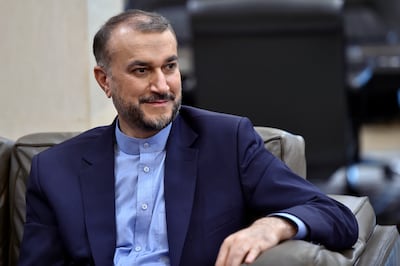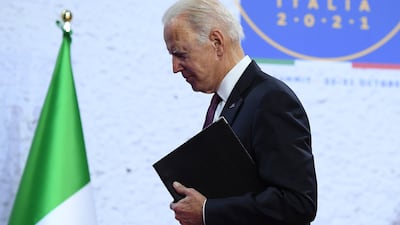As the US and EU continue to push for talks with Iran, President Joe Biden has pledged to return the US to full compliance with the Joint Comprehensive Plan of Action (JCPOA).
President Biden's commitment answered one of Iran's major demands during the Vienna talks.
A joint statement from Mr Biden, Germany’s Angela Merkel, France’s Emmanuel Macron and the UK’s Boris Johnson came after the US president met the European leaders.
“We welcome President Biden’s clearly demonstrated commitment to return the US to full compliance with the JCPOA and to stay in full compliance, so long as Iran does the same,” it said.
Mr Biden said at the G20 in Rome the US was suffering from the bad decisions of the Trump administration.
“We're continuing to suffer from the very bad decisions President Trump made to pull out of the JCPOA.”
The Iran nuclear deal, officially called the JCPOA, was abandoned by the Trump administration in 2018. Since the Biden administration took over, efforts to resurrect the deal have begun, though talks were put on pause in June after six rounds because of the Iranian presidential election.
Since the US exited the deal, Iran has increased its uranium enrichment and blocked IAEA inspections at its Natanz facility, causing concern among regulators and inspectors.
The Biden administration has promised to re-enter the JCPOA, but US and EU negotiators have been faced with tough talks and a hardline shift from Iran as Iran's new president and administration have taken a decidedly tougher stance towards any talks.
Last week, Iran said talks in Vienna would resume in November, but both President Ebrahim Raisi and his foreign minister have called on the US to lift sanctions as a show of goodwill.
On Sunday, Iran's Foreign Minister Hossein Amirabdollahian told state media if the US was serious about a deal, the Biden administration could issue an executive order rejoining the defunct JCPOA.

“It is enough for Biden to issue an executive order tomorrow and they announce they are rejoining the pact from the point where his predecessor left the deal," Mr Amirabdollahian said.
"If there is a serious will in Washington to return to the deal, there is no need for all these negotiations at all.”
US Secretary of State Antony Blinken on Sunday said the US was “absolutely in lockstep” with the UK, Germany and France on getting Iran back into a nuclear deal, but said it was unclear if Tehran was willing to rejoin the talks in a “meaningful way”.
Iran has expressed concern over the possibility of the US leaving the deal a second time. The JCPOA is not a signed treaty by the US Congress and is, therefore, not a binding agreement for future administrations, leaving open the possibility that the US could once again exit the accord.
To avoid the possibility of a second exit, Iran has sought pledges from the EU, including a commitment that the EU use the Instex trading device.
Instex was set up in 2019 to allow for trade between the EU and Iran, largely for medical payments. However, it has not been in operation since it was originally put in place.


